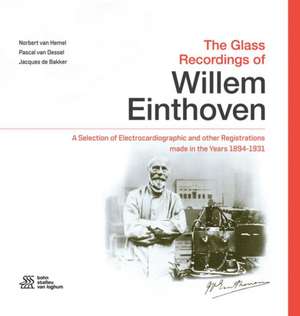The Glass Recordings of Willem Einthoven: A Selection of Electrocardiographic and other Registrations made in the Years 1894 - 1931
Autor Norbert M. van Hemel, Pascal F.H.M. van Dessel, Jacques M.T. de Bakkeren Limba Engleză Hardback – 15 apr 2019
“I want to know” was Willem Einthoven’s usual answer when congratulated on the success of his new scientific achievements. With the development of the string galvanometer, he became the founder of electrocardiography, which today remains the most popular and cost-effective tool for obtaining heart related data. The wide range of experimental studies conducted by Einthoven and his fellows in the fields of (amongst others), eye function, the nervous system, vagal nerves and respiration led to the award of the Nobel Prize on Physiology and Medicine.
The results of his experiments and electrocardiographic recordings of patients from 1886 to 1927 were registered on hundreds of “glass negatives”. These have remained stored in the Boerhaave State Museum, Leiden. Now, for the first time these recordings have been carefully analyzed and considered in their historical context. The remaining recordings can be seen on ‘www.rijksmuseumboerhaave.nl’.
Preț: 236.07 lei
Preț vechi: 293.22 lei
-19% Nou
Puncte Express: 354
Preț estimativ în valută:
45.18€ • 46.93$ • 37.53£
45.18€ • 46.93$ • 37.53£
Carte indisponibilă temporar
Doresc să fiu notificat când acest titlu va fi disponibil:
Se trimite...
Preluare comenzi: 021 569.72.76
Specificații
ISBN-13: 9789036823272
ISBN-10: 9036823277
Pagini: 164
Ilustrații: XII, 164 p.
Dimensiuni: 210 x 210 x 11 mm
Ediția:2019
Editura: BOHN STAFLEU VAN LOGHUM
Colecția Bohn Stafleu van Loghum
Locul publicării:Houten, Netherlands
ISBN-10: 9036823277
Pagini: 164
Ilustrații: XII, 164 p.
Dimensiuni: 210 x 210 x 11 mm
Ediția:2019
Editura: BOHN STAFLEU VAN LOGHUM
Colecția Bohn Stafleu van Loghum
Locul publicării:Houten, Netherlands
Cuprins
Willem Einthoven, a short history of his life and achievements,.- Methods of analysis and interpretation of the glass recordings.- A selection of the glass plates.
Recenzii
Notă biografică
Prof. Dr. Norbert M. van Hemel
Prof. Em. Department of Cardiology, University Medical Center Utrecht, Utrecht
Former staff member, Department of Cardiology, St Antonius Hospital, Utrecht, Nieuwegein
Dr. Pascal F.H.M. van Dessel, cardiologist
Thoraxcentrum Twente, Medisch Spectrum Twente, Enschede
Prof. Dr. Jacques M.T. de Bakker, medical engineer
Prof. Em,. Department of Experimental Cardiology, Amsterdam University Medical Center
Department of Medical Physiology, University Medical Center Utrecht, Utrecht
Prof. Em. Department of Cardiology, University Medical Center Utrecht, Utrecht
Former staff member, Department of Cardiology, St Antonius Hospital, Utrecht, Nieuwegein
Dr. Pascal F.H.M. van Dessel, cardiologist
Thoraxcentrum Twente, Medisch Spectrum Twente, Enschede
Prof. Dr. Jacques M.T. de Bakker, medical engineer
Prof. Em,. Department of Experimental Cardiology, Amsterdam University Medical Center
Department of Medical Physiology, University Medical Center Utrecht, Utrecht
Textul de pe ultima copertă
Besides a short survey of the life and work of Willem Einthoven, this book contains a selection of the most appealing recordings and demonstrates the significance of his scientific explorations.
“I want to know” was Willem Einthoven’s usual answer when congratulated on the success of his new scientific achievements. With the development of the string galvanometer, he became the founder of electrocardiography, which today remains the most popular and cost-effective tool for obtaining heart related data. The wide range of experimental studies conducted by Einthoven and his fellows in the fields of (amongst others), eye function, the nervous system, vagal nerves and respiration led to the award of the Nobel Prize on Physiology and Medicine.
The results of his experiments and electrocardiographic recordings of patients from 1886 to 1927 were registered on hundreds of “glass negatives”. These have remained stored in the Boerhaave State Museum, Leiden. Now,for the first time these recordings have been carefully analyzed and considered in their historical context. The remaining recordings can be seen on ‘www.rijksmuseumboerhaave.nl’.
“I want to know” was Willem Einthoven’s usual answer when congratulated on the success of his new scientific achievements. With the development of the string galvanometer, he became the founder of electrocardiography, which today remains the most popular and cost-effective tool for obtaining heart related data. The wide range of experimental studies conducted by Einthoven and his fellows in the fields of (amongst others), eye function, the nervous system, vagal nerves and respiration led to the award of the Nobel Prize on Physiology and Medicine.
The results of his experiments and electrocardiographic recordings of patients from 1886 to 1927 were registered on hundreds of “glass negatives”. These have remained stored in the Boerhaave State Museum, Leiden. Now,for the first time these recordings have been carefully analyzed and considered in their historical context. The remaining recordings can be seen on ‘www.rijksmuseumboerhaave.nl’.
Caracteristici
Unique selection of (ECG) recordings made by Willem Einthoven Demonstrates the development of ECG as diagnostic instrument
